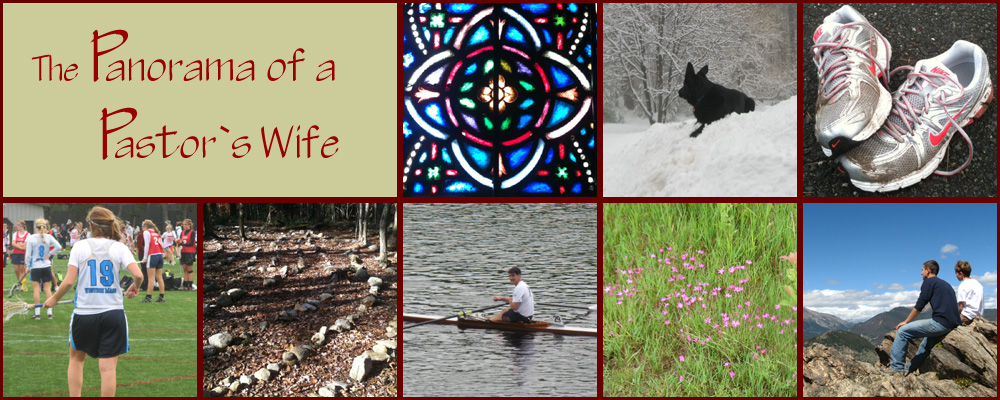He Packed a Punch
A whole lot has happened since Muhammad Ali left us. But since my particular mission here has always been illuminating and celebrating contrasts of all kinds — the “Look, there’s this but right next to it there’s that” moments — I’m sticking with the Greatest for a time.
Soon after he died, a friend of mine, in a Facebook post, said she was surprised to learn that Ali had been such a humanitarian in addition to being a boxing champion. Indeed he was both, although mostly in different chapters of his life. Tossing in his tremendous youthful braggadocio as well as the suffering from Parkinson’s that he endured during the last few decades, this is what made him so endlessly fascinating, so completely impossible to pin down. He was, as countless people have said, “transcendent.”
Quite apart from his exploits in the ring, how often has someone so completely full of himself been so thoroughly appealing in the delight he took in making poems? Here’s a classic, just to get us going, one of the many gems you may have heard re-played recently.
Don’t worry, I’m not foolish enough to attempt another tribute here, another go at capturing the essence of Ali. Call my refusal “rope-a-dope” or just plain “nope.”
What I can offer, though, is a memory of visiting a place where I’m guessing most of you haven’t had a chance to go…and that’s the Muhammad Ali Center, in his hometown of Louisville, Kentucky.
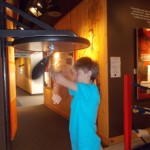
My son Henry and I spent a few hours there several summers ago, on the tail end of a southern swing. We were headed back to join my husband at the Convention of the Episcopal Church, happening that hot, dry summer in Indianapolis. Some longtime blog readers (champions of a different sort) may even recall that I wrote about this trip soon afterwards. Like it or not, though, it’s come around again. Death does that sort of thing. Am I ever glad that we took the time to stop in at this quiet but powerful place on the banks of the Ohio River, which had been founded by Ali and his wife Lonnie just a handful of years earlier, in 2005.
Why go at all? Well, I suppose that had something to do with the fact that I grew up with four older brothers who played and talked sports all the time; Ali had been a kind of mystical presence in our home. And also because, years later, my older son had recently started going to a boxing gym himself, inspired in part by the Ali story. What were the workouts like? Hard enough to be really satisfying.
At the Ali Center, there’s plenty of boxing memorabilia, stations where you can try out some moves, and on one floor a full replica of a ring. After all, boxing is what put him on top of the world, for a time.
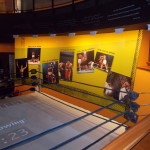
But since the place was founded to “share the ideals” of Muhammad Ali and to raise up “a new generation of leaders” (check out a program called”Generation Ali”) the emphasis is really much more on the expanse of modern American history – the Civil Rights movement, the Vietnam War, Education, Gender Equality, Global Citizenship — the different arenas in which all kinds of people have been willing to stand up for justice.
Before coming in and getting your entry ticket, would you expect that you would be making your way through exhibits with these headings? The following descriptions come right from the Ali Center website, where there’s also a just-posted video tribute and plenty of other wandering you can do.
SIX CORE PRINCIPLES
Confidence
Belief in oneself, one’s abilities, and one’s future.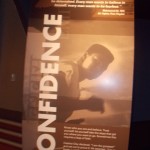
Conviction
A firm belief that gives one the courage to stand behind that belief, despite pressure to do otherwise.
Dedication
The act of devoting all of one’s energy, effort, and abilities to a certain task.
Giving
To present voluntarily without expecting something in return.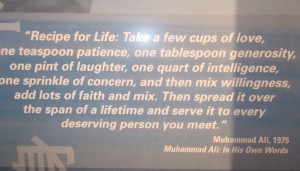
Respect
Esteem for, or a sense of the worth or excellence of, oneself and others
Spirituality
A sense of awe, reverence and inner peace inspired by a connection to all of creation and/or that which is greater than oneself.
I don’t see anything about knocking somebody out or any kind of domination here. Ali himself apparently often said that his life in boxing was just a way for him to get to a place where he could affect lasting positive change. Did the ends justify the means? Hard to say, if you put it that way, because there was indisputably so much injury along the way. In fact, wasn’t the constant pounding a kind of evil to the brain? These questions don’t go away, and it remains to be seen whether the sport can ever become something close to “safe,” although it is definitely true that people of all ages can and do benefit from elements of a boxing workout that train the muscles as well as focus the mind.
Conflicted over, or downright opposed to boxing as many of us remain, there can be no question about the kind of tireless ambassador of goodness Ali was. Here’s a paragraph that’s been on the Center’s website for some time:
His awareness of the needs of the developing world has guided much of his good work. He has served as a symbol of hope and a catalyst for constructive international dialogue, has delivered sorely-needed medical supplies to an embargoed Cuba, provided more than 22 million meals to the world’s hungry, and helped secure the release of 15 U.S. hostages from Iraq during the first Gulf War. As testament to his work in developing nations, the United Nations named him a Messenger of Peace, and he was awarded the Presidential Medal of Freedom, as well as Amnesty International’s Lifetime Achievement Award. In September 2012, he was the recipient of the prestigious National Constitution Center Liberty Medal.
Perhaps not surprisingly, it is the “Messenger of Peace” Ali who comes across most strongly in Louisville. Confusing? Yes, in a way. We hardly imagine a dove when we think of the slugger. Then again, maybe this larger-than-life story reminds us of the virtues of fighting off any outside attempts to limit the scope of our individual souls that are, ultimately, only in our own power to shape.
